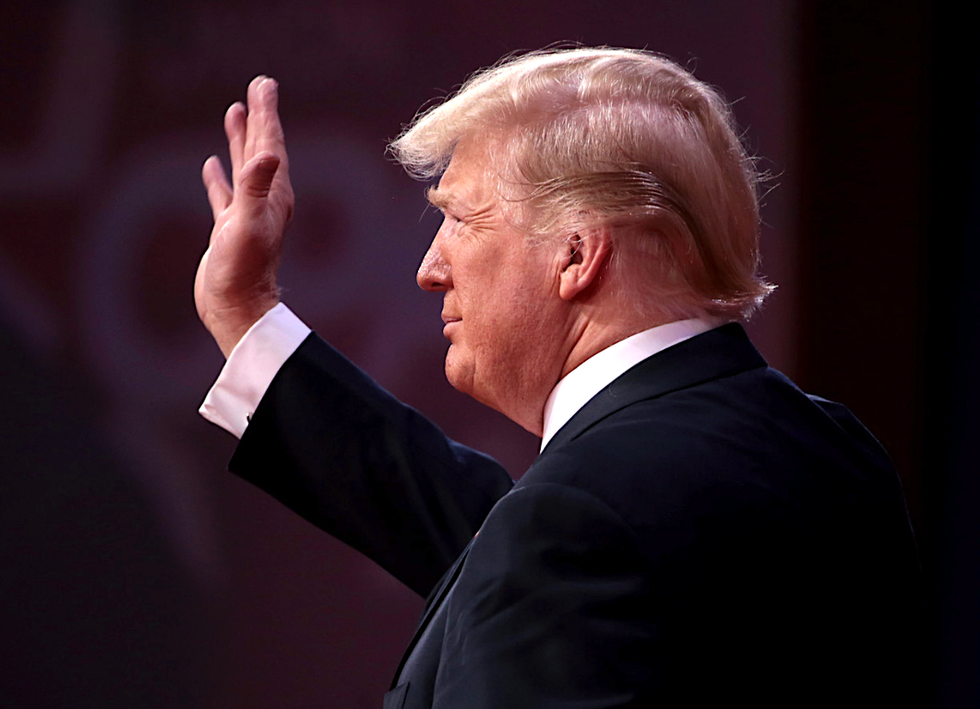
Last week, President Trump was the subject of a huge wave of backlash after he said that American Jews who vote Democrat are "being disloyal to Jewish people" and "very disloyal to Israel." The comments came on the heels of Trump retweeting fringe right-wing radio host Wayne Allen Root, who called the President the "King of Israel." But as Haaretz's Allison Kaplan Sommer points out, Root, who is known for disseminating conspiracy theories and false claims, was speaking as a Jew when he praised Trump as an exalted champion of the Jewish people.
“President Trump is the greatest president for Jews … in the history of the world and the Jewish people in Israel love him like he’s the king of Israel,” Root said. “They love him like he is the second coming of God. But American Jews don’t know him or like him. They don’t even know what they’re doing or saying anymore. It makes no sense!”
Root, however, is a messianic Jew, or as he's described himself in the past, a "Jew turned evangelical Christian."
Writing for Haaretz, Kaplan says that before Trump, no U.S. president would have endorsed a messianic Jew as someone to speak for American Jews.
Every Jewish denomination has rejected the assertion that ethnic Jews who accept Jesus as the Jewish Messiah and the son of God remain Jewish. Many regard the concept of Messianic Judaism as a manipulative method of proselytizing and converting Jews to Christianity. The battle over whether Messianic Jews – also known as “Jews for Jesus” – should be permitted to immigrate to Israel under the Law of Return has been waged for decades in Israeli courts....
But Trump and his White House, which is more enthusiastically supported by and closely bound to evangelical Christian organizations than any preceding administration, hasn’t hesitated to include and embrace Messianic Jews, who are part of that evangelical community. While there is no data on the specific voting patterns of Messianic Jews, anecdotal evidence that they hew to the same political views as their evangelical fellow travellers points to the fact that they are among the most “loyal” Jews Trump can find.
Kaplan goes on to point out that during a meeting with 40 evangelical pastors and televangelists back in 2015, among the group praying for then-candidate Trump was Messianic Rabbi Kirt Schneider. In a now-infamous video of the group laying their hands on Trump in prayer, Schneider places his hand on Trump’s face and declares, “The only two nations that have ever been in a relationship with God are Israel and the United States of America.”
Another messianic Jew within Trump's inner circle is Jay Sekulow, who is Trump's personal attorney and one of his most vigorous defenders on cable TV.
Sekulow, who wrote a personal account of his spiritual path on the Jews for Jesus website in 2005 (“How a Jewish Lawyer From Brooklyn Came to Believe in Jesus”), came to Trump as a celebrity legal warrior for conservative Christian causes. The Messianic Jew is affiliated with Jews for Jesus and has served on its national board and as its general counsel. He argued and won a landmark case on behalf of the group before the Supreme Court in 1987. He is currently the chief counsel at the American Center for Law and Justice, a Christian activist organization founded by televangelist Pat Robertson.
Even after the slaughter of 11 worshippers at Pittsburgh's Tree of Life Congregation Synagogue, the Trump administration chose a messianic Jew to speak for the victims. Loren Jacobs, who was invited onstage during a rally by Vice President Mike Pence to say a prayer for the victims, invoked the name of Jesus as he spoke.
“God of Abraham, God of Isaac, God of Jacob, God and Father of my Lord and Savior Yeshua, Jesus the Messiah, and my God and Father too,” Jacobs prayed.
According to Rabbi David Rosen of the American Jewish Committee, the Trump administration's promoting of people "whose theology is a threat to Jewish integrity and theology is obviously highly problematic."
“Those who describe themselves as Messianic Jews or Hebrew Christians are purposely seeking to confuse the clear difference between Judaism and Christianity," he told Haaretz. "They are to a large degree, part of a eschatological agenda of the End of Days, one that sees Jews either being converted to Christianity or being annihilated. And that is hardly a savory prospect for Jews."
Featured image via Gage Skidmore/Flickr




